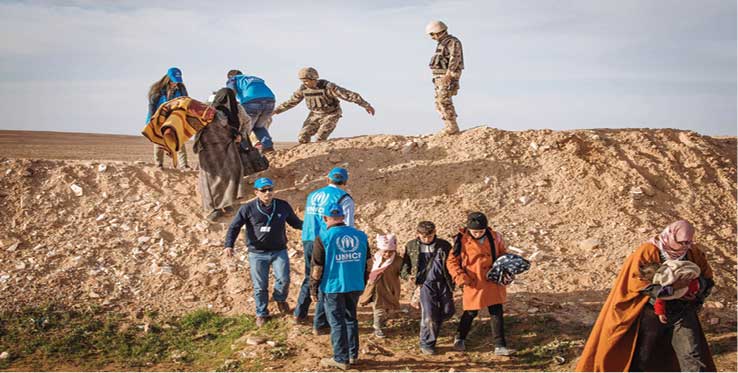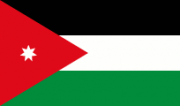
In 2016, we submitted to the UN Mechanisms 17 communications regarding 8 individuals.

JORDAN
 Our Concerns
Our Concerns
- Practice of torture and incommunicado detention by the General Intelligence Directorate;
- Judicial harassment against any dissenting voices on the basis of draconian laws;
- Unfair trials before the State Security Court and the admission of confessions extracted under torture.
 Recommendations
Recommendations
- Bring an end to the practice of torture by ensuring that confessions extracted under torture are not admitted as evidence during trials, that all allegations are thoroughly investigated, and that perpetrators are prosecuted;
- Amend the Anti-Terrorism Law and article 149 of the Penal Code to ensure that they do not constitute a basis on which to prosecute acts of free speech;
- Abolish the State Security Court;
- Amend repressive legislations to create a legal framework in which the rights to freedom of expression, association and peaceful assembly are guaranteed.
 Upcoming
Upcoming
- October-November 2017: Review of Jordan by the Human Rights Committee;
- 9 December 2017: One-year delay in the submission of Jordan’s follow-up report to the Committee against Torture.
This year, Jordan continued to suffer the repercussions of the Syrian conflict. The country now hosts around 650,000 refugees, amounting to approximately 10% of its total population. In June 2016, after a bomb attack by the Islamic State near the refugee camp of Al Rukban killed seven Jordanian soldiers, the country’s army chief decided to seal off the entire Syrian border, barring access even to aid agencies. As a result, approximately 70,000 refugees, half of whom are children, were blocked in the “berm” – a barren demilitarised desert area. Already living in appalling conditions, without access to food, water, and medical care, their situation quickly deteriorated. Despite talks with international aid agencies, Jordan only allows for aid drops by crane over the wall demarcating the border, which it still refuses to re-open.
On the political side, in March 2016, the electoral law was amended to allow multiple votes for open proportional lists, replacing the decade-old single-vote system. In April, the Parliament passed several constitutional amendments giving the King more powers, including the right to appoint the head of the Constitutional Court as well as members of the Senate. Critics denounced this move, arguing that Jordan was shifting toward an absolute monarchy. That same month, the security services closed the Amman headquarters of the Muslim Brotherhood, considered by the authorities as illegal because its licence was not renewed.
On 20 September 2016, legislative elections for the 18th Lower House of Parliament – which has limited political power over governmental policies, since the King appoints members of the Parliament’s Upper House – were held. The Islamic Action Front – the Muslim Brotherhood’s political wing – and its allies, who boycotted the last two elections, secured 16 seats.

Human rights violations in the context of counterterrorism
1 November 2016 marked the 10-year anniversary of the Jordanian “Prevention of Terrorism Act”, enacted in response to the 2005 hotel bombings in Amman that left 60 people dead. Since then, numerous violations have been committed by the authorities under the pretext of counterterrorism, most notably by the General Intelligence Directorate (GID) – the country’s national intelligence agency that is controlled directly by the King – and the State Security Court (SSC), an exceptional jurisdiction whose members, two military judges and one civilian judge, are directly appointed by the executive.
In this respect, the cases documented by Alkarama largely follow the same pattern: victims are arrested by the GID without a warrant and detained incommunicado at the GID premises in Amman, during which they are tortured and ill-treated in order to extract incriminating confessions. Since the SSC General Prosecutor is housed on GID premises, victims are subsequently charged and prosecuted on the basis of confessions extracted under torture, before being sentenced under the Anti-Terrorism Law.
This year, Alkarama documented the cases of Adam Al Natour, a 21-year-old Polish and Jordanian student, and Hatem Al Darawsheh, a 19-year-old high school student. Both men were detained incommunicado for several weeks at the GID premises, where they were tortured extensively. In February and December 2016, respectively, the two young men were sentenced to four years in prison by the SSC for “terrorism” on the basis of confessions extracted under torture.
In August 2016, upon Alkarama’s request, the United Nations Working Group on Arbitrary Detention, issued an Opinion on the case of Adam Al Natour, which qualified his detention as “arbitrary” and requested the authorities to release him immediately. To date, however, the government is yet to take any action to this effect.
This year, Alkarama also received the testimony of a victim who was disappeared for four months at the hands of the GID. On 27 February, Abdulmalik Mohammad Yousef Abdelsalam, a 26-year-old Jordanian university student, disappeared after he landed in Amman’s airport. Concerned over his disappearance, Alkarama has written to the UN Working Group on Enforced or Involuntary Disappearances; however, the Jordanian authorities never responded to the UN experts’ request. It is only on 29 June 2016 that Mr Abdelsalam was released without any judicial procedure.

Systematic violations to freedom of expression and peaceful assembly
In 2016, human rights defenders, political opponents, journalists, and critics of the government have suffered from restrictions on their right to freedom of expression, suffering from arbitrary detention and unfair trials before the State Security Court. The latter exercises jurisdiction for acts of terrorism, which since the 2014 amendments to the Anti-Terrorism Law, includes nonviolent acts and entails harsh sentence of a minimum of five years imprisonment. Victims have been prosecuted by the SSC for “disturbing the public order” or for “disturbing relations with a foreign country”, charges that leave a window for interpretation.
It is under the latter accusation that Professor Amjad Qourshah, a professor in comparative religions and famous TV and radio presenter, was detained by the GID for three months in 2016. Mr Qourshah released a video in which he criticised Jordan’s participation in the international coalition against the Islamic States, which he considered to be part of the United States’ agenda, and which, in his opinion, was forcing Arab States to fight a war that is not theirs.
Other critics have been prosecuted by the SSC on the basis of repressive provisions of the Jordanian Penal Code, in particular article 149, which sanctions anyone who “encourages the contestation of the political system” or “commits an individual or collective act in order to change the fundamental structures of society”. This was the case of Professor Eyad Qunaibi, who was released on 17 May 2016 after having spent a year in detention on a charge of “incitement against the political regime”, having published a Facebook post criticising, among others, his country’s ties with Israel. During his trial, references to specific sections of his article, which indisputably showed that he had been prosecuted solely for exercising his fundamental rights, were presented as sole evidence in support of the case against him. Despite the intervention of the UN Special Rapporteur on the promotion and protection of the right to freedom of opinion and expression, seized by Alkarama, the State Security Court failed to recognise that Professor Qunaibi was arbitrarily detained for having exercised his right to the freedom of expression and similarly failed to acquit him.
Lastly, in March 2016, amendments to the 2008 Law on Associations were published, which, if adopted, would seriously infringe the ability of NGOs to operate in the country. Indeed, the law prohibits the registration of associations whose aims violate “national security, public safety, public health, public order, public morals, or the rights and freedom of others”; an overly broad list that leaves room for misinterpretations and abuse. Moreover, the registration of an organisation would automatically be rejected in the absence of a response from the government and may be dissolved upon recommendation of a relevant Minister. Furthermore, the law allows for further governmental control of NGOs since organisations must submit prospective annual plans to the government and allow government officials to attend their meetings. Such measures, if adopted, would greatly undermine the work of associations in the country and constitute a clear violation of the freedom of association and peaceful assembly.

GLOBAL ALLIANCE OF NATIONAL HUMAN RIGHTS INSTITUTIONS MAKES RECOMMENDATIONS TO NATIONAL CENTRE FOR HUMAN RIGHTS
On 26 January 2016, the Subcommittee on Accreditation (SCA) of the Global Alliance for National Human Rights Institutions (NHRIs) published a report in which it made recommendations to the National Centre for Human Rights (NCHR) to ensure its full compliance with the Paris Principles, a set of international standards aiming at ensuring the independence and impartiality of NHRIs. Although the review of the NCHR was set to take place in November 2015, the Centre had requested a deferral in order to have time to propose amendments within domestic law that would enable it to comply fully with the Paris Principles.
In its report, the SCA raised several concerns, echoing those highlighted in Alkarama’s 2015 report. First, the SCA noted the lack of transparency with regard to the appointment and dismissal procedures and called upon the NCHR to “establish clear and uniform criteria upon which all parties assess the merit of eligible applicants” and to clearly define the grounds for dismissal, which cannot “be based solely on the discretion of the appointing authorities”. Another issue of concern was the appointment of two parliamentarians as members of the Board of Trustees. Indeed, government representatives and members of the Parliament should not be members of, nor participate in, decision-making bodies of a NHRI. Thirdly, the SCA encouraged the NCHR to “conduct ‘unannounced’ visits as this limits opportunities for detaining authorities to hide or obscure human rights violations and facilitates greater security”. Indeed, as was highlighted by Alkarama, even though the NCHR theoretically holds the right to visit places of detention, in practice, it requires previous authorisation from the authorities.
In December 2016, the Jordanian media reported that the Parliament had approved draft amendments to the NCHR Law. Nevertheless, this law still requires the endorsement of the Senate and the King. Alkarama welcomes this development and calls on the NCHR to ensure that the amendments in question will effectively ensure its full impartiality and effectiveness. The Jordanian authorities should also allow the NCHR to undertake reforms, so that they can successfully protect and promote human rights in the country.